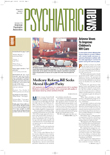In writing my next-to-last column as president, I wanted to express my concerns about "evidence-based" psychiatry. On the surface it seems reasonable and scientific to the medical community, to policymakers, and to organized systems of care to base medical treatment on "evidence." As in many things, the devil is in the details. For example, who will determine what is considered as evidence or what is acceptable as scientific evidence when it comes to medical care and decision making?Let us assume for the moment that well-controlled scientific studies have been replicated by a number of investigators and gain broad acceptance. An example might be clear evidence that placing patients on anticoagulants following myocardial infarctions significantly increases their life span. With such a well-documented finding, it is quite reasonable to expect that these patients would be anticoagulated. Should it be done most of the time? Yes. Should it be done all the time? No. What if the patient has a coagulation disorder? The point is that even in this case, with what seems like a clear indication, the treating physician knows what is best for her patient and would do potential harm following this well-established evidence. There is no substitute for clinical judgment.
Many recommended treatments will not have such clear science behind them. In orthopedics, new hip-replacement components come on the market before there has been sufficient time to adequately evaluate the components they are replacing. Therefore, no long-term outcomes can be determined. Should our orthopedic colleagues refuse to use the apparently improved artificial hip joints while they await outcome studies on the older replacements? Should cardiac surgeons do coronary artery bypass surgeries to relieve anginal pain, knowing that the surgery is unlikely to prolong a patient's life?
We know that "scientific" study outcomes can be distorted by the way studies are designed. Can we be sure an investigator wasn't influenced in his interpretation or design of a "scientific" study by a funding source, pressures to publish meaningful results, or other factors? In the past, we tended to rely on studies that were published in leading medical journals. Most studies were done in university settings. Now many studies are done in clinical settings without the checks and balances in academia. Are the published studies as reliable and free from outside influences now as they were in the past?Up to now I have been writing in general about some of the problems with "evidence-based" data. It doesn't take much imagination to guess how such data could be misused either to deny or insist on certain forms of treatment.
How does all of this apply to psychiatry? There is a strong push to elevate "evidence-based" psychiatric treatments above other established forms of treatment. There is merit in this approach, but also significant dangers. When we document that our treatments are evidence based, our field is more accepted by our medical colleagues, and we may feel more secure in our work with patients. As we know, short-term psychotherapies are much easier to study than longer-term psychotherapies. However, if we are pushed into limiting our treatments to those that are easily studied, many worthwhile treatments would be eliminated. As Drew Clemens stated when he was speaker of the APA Assembly, psychiatry is in danger of losing its soul. We must not let that happen. Our field, more than any other, relies on our therapeutic relationship with patients coupled with insight and empathic clinical judgment. We can use our studies and algorithms as helpful guidelines, but it is essential that we not fall into the trap of "cookbook medicine." The meaning and benefit of both the therapeutic and real relationships with our patients must not be underestimated.
A patient asked if she smelled alcohol in my office. Knowing the patient's history, her psychodynamic conflicts, where we were in her treatment, the current transferences and countertransferences, and whether or not there was an unusual odor in my office helped me determine the most appropriate therapeutic response. This automatic, frequent appraisal and interaction with my patients is part of the art of treatment. It distinguishes our field. We must not lose it. ▪

